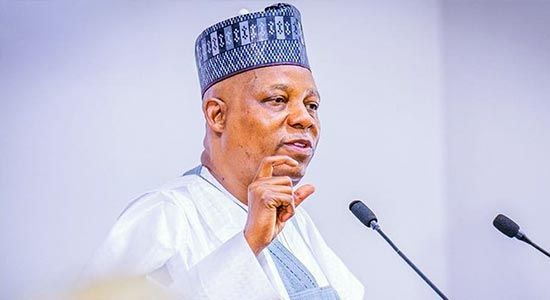By Lawrence Olaoye,New Telegraph
Copyright newtelegraphng

…says Nigeria positioned as natural hub for AfCFTA’s $3.4 trillion market
Vice President Kashim Shettima has showcased Nigeria’s $200 billion energy transition opportunity to investors, emphasising the need for partnerships to maximise the multi-faceted, multi-billion-dollar investment opportunities across the country.
This came as he highlighted that Nigeria’s sovereign rating by platforms like Fitch and Moody’s implied the country was positioned as the natural hub for the African Continental Free Trade Area’s (AfCFTA) $3.4 trillion market.
He seized the moment to draw the attention of investors worldwide to the multi-billion, multi-faceted economic resets across Nigeria, as embodied by President Bola Tinubu’s Renewed Hope Agenda.
According to a release by his spokesman, Stanley Nkwoccha, Shettima stated this at the Roundtable hosted by the Business Council for International Understanding (BCIU), with the theme “Risk, Reform, Return,” held on the margins of the 80th Session of the United Nations General Assembly, New York City, on Monday.
Shettima, representing the President at UNGA80, highlighted that in this interconnected age, the wealth of any nation was neither achieved through miracles nor inherited.
Showcasing the wealth of the nation, he began by saying that Nigeria remained West Africa’s largest economy and Africa’s largest consumer market, with 236 million people today, projected to reach 320 million by 2040.
Beyond being a demographic giant, Shettima pointed out that with a median age of about 17, more than 58 per cent of whom are under 30, Nigeria was home to one of the deepest talent pools in the world.
“When you add to this our geographic position as a natural hub for trade between Africa, the Americas, and Asia; our 44 distinct natural resources; our five tech unicorns; the largest oil reserves in Africa; and 210 trillion cubic feet of proven gas reserves, you see that Naija no dey carry last,” he added.
The Vice President told the global audience that since mid-2023, under Tinubu’s Renewed Hope Agenda, Nigeria has embarked on one of the boldest economic resets in its history.
He cited the unification of Nigeria’s exchange rates, the removal of decades-old fuel subsidies that distorted the Nigerian economy, the modernisation of Nigeria’s tax and customs regimes, strengthened fiscal oversight, and the overhaul of Nigeria’s trade and investment policies as shining examples of the Renewed Hope reforms.
He continued, “This reset includes full implementation of the AfCFTA, the roll-out of a National Single Window for trade, a new Investment and Securities Act, an upgraded PPP framework, and modernised bilateral investment treaties.
“The results are already visible. Our GDP growth is accelerating, our external reserves are strengthening, and inflation is moderating. This is why investor commitments are also rebounding.”
Stressing Nigeria’s vast economic transformation and potential, the Vice President recalled that in April, Fitch upgraded Nigeria’s sovereign rating to B with a stable outlook, and Moody’s lifted its issuer rating to B3 with a stable outlook.
He highlighted that the two rating platforms cited Nigeria’s improved buffers and clearer policy direction as their barometer, adding that “This positions Nigeria as the natural hub for the AfCFTA’s 3.4 trillion-dollar market.”
“We have also built a four-pillar incentives framework designed to reduce investor risk, accelerate cash returns, and make Nigeria one of the most competitive destinations for capital in the Global South.
“A simpler, predictable tax regime now offers clear capital allowances, research and development deductions, and export-linked rebates, while investors in priority sectors can achieve faster breakeven through five per cent annual tax credits on qualifying capital expenditure,” he highlighted.



